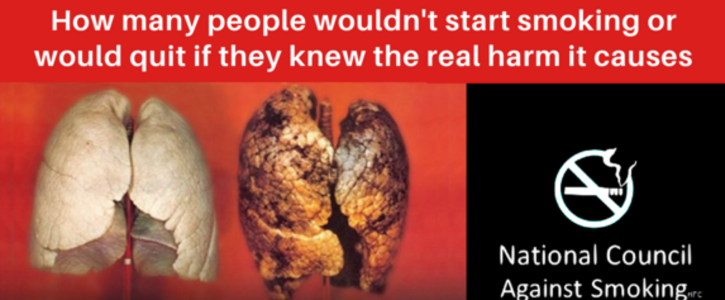1,000 signatures reached
To: Ms Lyn Moeng-Mahlangu , Health Department Chief Director for Non-Communicable Diseases
Support new anti-smoking laws, send in your submission

Public comments are closed. We will update you on any new campaign developments.
Why is this important?
Even if you don’t smoke, you are exposed to secondhand smoke that can put you at risk of developing cancer, strokes, heart disease, bronchitis, pneumonia and asthma.
Ike never smoked a day in her life, but this mother of two developed throat cancer, which doctors say was likely caused by secondhand smoke.
https://www.youtube.com/watch?v=QRQZp2WeGBM
All South Africans should have a right to clean air, but secondhand smoking threatens the health of those who don’t smoke, especially children. Secondhand smoke increases the chances of people developing bronchitis, pneumonia, asthma and heart disease [1]. There is no safe level of secondhand smoke exposure.
That’s why the Department of Health’s proposed Tobacco Control Bill is so important, because it will ban smoking in public places and in vehicles with children under the age of 18. The draft bill proposes laws which will help to reduce smoking by introducing plain packaging and graphic health warnings as well as the regulation of e-cigarettes [2].
But the Tobacco Industry is mobilising to protect their profits, and are making submissions to water down the draft Bill. The Tobacco Industry spent decades denying that their product kills up to half of its users [3], but we know that smoking is the leading driver of lung cancer, causing 80% of cases [4]. What is more, 116 people died in South Africa every day from tobacco-related disease [5].
We are running out of time. Public submissions to support government's draft Bill close on the 9th of August 2018. If enough of us send in public submissions sharing why we want clean air and less smoking, and why we support the Bill, we can ensure we have the numbers to pass the draft Bill and make it law.
According to the American Lung Association at least 69 chemicals in cigarettes are known to cause cancer and many are poisonous [6]. Chemicals include acetone (used in paint stripper), ammonium (used in toilet cleaner), lead, arsenic (used in rat poison), benzene which is produced by burning cigarettes and is used in pesticides [7] and nicotine (used in insecticide).
Earlier this month researchers published a study which contradicts a major claim by the e-cigarette industry. The study found that smokers who did not use e-cigarettes to quit smoking were more than twice as likely to quit, than smokers who use e-cigarettes [8].
For more information visit https://www.againstsmoking.co.za/
Follow our #BeSmokeFree campaign on Twitter @SAQuitline
References
[1] World Health Organization. International Consultation on Environmental Tobacco Smoke (ETS) and Child Health. January 11–14, 1999
[2] http://www.health.gov.za/index.php/2014-03-17-09-09-38/policies-and-guidelines/doc3
[3] http://www.who.int/news-room/fact-sheets/detail/tobacco
[4] Quit smoking - save your life. Kerry Cullinan for Health-e News 31 May 2018
[5] The Tobacco Atlas, sixth edition. Jeffrey Drope and Neil Schluger
[6] American Lung Association, Smoking Facts
[7] Tobacco Free Life, Carcinogenic Compounds in Cigarette Smoke.
[8] https://www.wsj.com/articles/vaping-doesnt-often-help-smokers-quit-new-study-finds-1531159338
Ike never smoked a day in her life, but this mother of two developed throat cancer, which doctors say was likely caused by secondhand smoke.
https://www.youtube.com/watch?v=QRQZp2WeGBM
All South Africans should have a right to clean air, but secondhand smoking threatens the health of those who don’t smoke, especially children. Secondhand smoke increases the chances of people developing bronchitis, pneumonia, asthma and heart disease [1]. There is no safe level of secondhand smoke exposure.
That’s why the Department of Health’s proposed Tobacco Control Bill is so important, because it will ban smoking in public places and in vehicles with children under the age of 18. The draft bill proposes laws which will help to reduce smoking by introducing plain packaging and graphic health warnings as well as the regulation of e-cigarettes [2].
But the Tobacco Industry is mobilising to protect their profits, and are making submissions to water down the draft Bill. The Tobacco Industry spent decades denying that their product kills up to half of its users [3], but we know that smoking is the leading driver of lung cancer, causing 80% of cases [4]. What is more, 116 people died in South Africa every day from tobacco-related disease [5].
We are running out of time. Public submissions to support government's draft Bill close on the 9th of August 2018. If enough of us send in public submissions sharing why we want clean air and less smoking, and why we support the Bill, we can ensure we have the numbers to pass the draft Bill and make it law.
According to the American Lung Association at least 69 chemicals in cigarettes are known to cause cancer and many are poisonous [6]. Chemicals include acetone (used in paint stripper), ammonium (used in toilet cleaner), lead, arsenic (used in rat poison), benzene which is produced by burning cigarettes and is used in pesticides [7] and nicotine (used in insecticide).
Earlier this month researchers published a study which contradicts a major claim by the e-cigarette industry. The study found that smokers who did not use e-cigarettes to quit smoking were more than twice as likely to quit, than smokers who use e-cigarettes [8].
For more information visit https://www.againstsmoking.co.za/
Follow our #BeSmokeFree campaign on Twitter @SAQuitline
References
[1] World Health Organization. International Consultation on Environmental Tobacco Smoke (ETS) and Child Health. January 11–14, 1999
[2] http://www.health.gov.za/index.php/2014-03-17-09-09-38/policies-and-guidelines/doc3
[3] http://www.who.int/news-room/fact-sheets/detail/tobacco
[4] Quit smoking - save your life. Kerry Cullinan for Health-e News 31 May 2018
[5] The Tobacco Atlas, sixth edition. Jeffrey Drope and Neil Schluger
[6] American Lung Association, Smoking Facts
[7] Tobacco Free Life, Carcinogenic Compounds in Cigarette Smoke.
[8] https://www.wsj.com/articles/vaping-doesnt-often-help-smokers-quit-new-study-finds-1531159338
.png)
